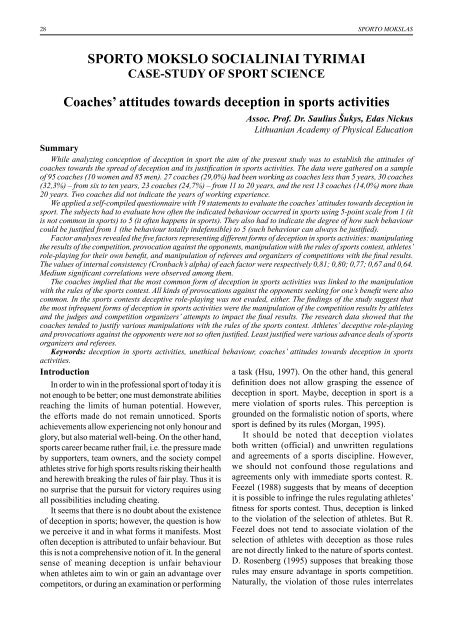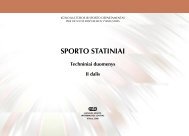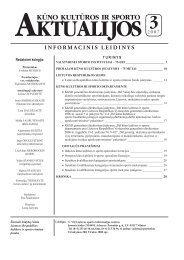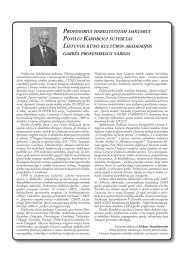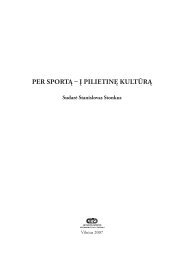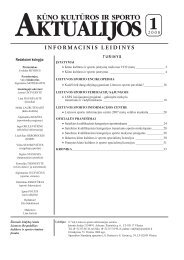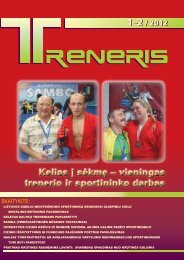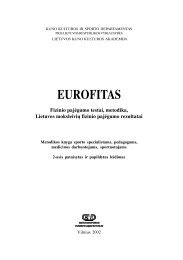Nr. 1 - Lietuvos sporto informacijos centras
Nr. 1 - Lietuvos sporto informacijos centras
Nr. 1 - Lietuvos sporto informacijos centras
You also want an ePaper? Increase the reach of your titles
YUMPU automatically turns print PDFs into web optimized ePapers that Google loves.
28<br />
SPORTO MOKSLAS<br />
SPORTO MOKSLO Socialiniai tyrimai<br />
Case-Study of Sport Science<br />
Coaches’ attitudes towards deception in sports activities<br />
Introduction<br />
In order to win in the professional sport of today it is<br />
not enough to be better; one must demonstrate abilities<br />
reaching the limits of human potential. However,<br />
the efforts made do not remain unnoticed. Sports<br />
achievements allow experiencing not only honour and<br />
glory, but also material well-being. On the other hand,<br />
sports career became rather frail, i.e. the pressure made<br />
by supporters, team owners, and the society compel<br />
athletes strive for high sports results risking their health<br />
and herewith breaking the rules of fair play. Thus it is<br />
no surprise that the pursuit for victory requires using<br />
all possibilities including cheating.<br />
It seems that there is no doubt about the existence<br />
of deception in sports; however, the question is how<br />
we perceive it and in what forms it manifests. Most<br />
often deception is attributed to unfair behaviour. But<br />
this is not a comprehensive notion of it. In the general<br />
sense of meaning deception is unfair behaviour<br />
when athletes aim to win or gain an advantage over<br />
competitors, or during an examination or performing<br />
Assoc. Prof. Dr. Saulius Šukys, Edas Nickus<br />
Lithuanian Academy of Physical Education<br />
Summary<br />
While analyzing conception of deception in sport the aim of the present study was to establish the attitudes of<br />
coaches towards the spread of deception and its justification in sports activities. The data were gathered on a sample<br />
of 95 coaches (10 women and 85 men). 27 coaches (29,0%) had been working as coaches less than 5 years, 30 coaches<br />
(32,3%) – from six to ten years, 23 coaches (24,7%) – from 11 to 20 years, and the rest 13 coaches (14,0%) more than<br />
20 years. Two coaches did not indicate the years of working experience.<br />
We applied a self-compiled questionnaire with 19 statements to evaluate the coaches’ attitudes towards deception in<br />
sport. The subjects had to evaluate how often the indicated behaviour occurred in sports using 5-point scale from 1 (it<br />
is not common in sports) to 5 (it often happens in sports). They also had to indicate the degree of how such behaviour<br />
could be justified from 1 (the behaviour totally indefensible) to 5 (such behaviour can always be justified).<br />
Factor analyses revealed the five factors representing different forms of deception in sports activities: manipulating<br />
the results of the competition, provocation against the opponents, manipulation with the rules of sports contest, athletes’<br />
role-playing for their own benefit, and manipulation of referees and organizers of competitions with the final results.<br />
The values of internal consistency (Cronbach’s alpha) of each factor were respectively 0,81; 0,80; 0,77; 0,67 and 0,64.<br />
Medium significant correlations were observed among them.<br />
The coaches implied that the most common form of deception in sports activities was linked to the manipulation<br />
with the rules of the sports contest. All kinds of provocations against the opponents seeking for one’s benefit were also<br />
common. In the sports contests deceptive role-playing was not evaded, either. The findings of the study suggest that<br />
the most infrequent forms of deception in sports activities were the manipulation of the competition results by athletes<br />
and the judges and competition organizers’ attempts to impact the final results. The research data showed that the<br />
coaches tended to justify various manipulations with the rules of the sports contest. Athletes’ deceptive role-playing<br />
and provocations against the opponents were not so often justified. Least justified were various advance deals of sports<br />
organizers and referees.<br />
Keywords: deception in sports activities, unethical behaviour, coaches’ attitudes towards deception in sports<br />
activities.<br />
a task (Hsu, 1997). On the other hand, this general<br />
definition does not allow grasping the essence of<br />
deception in sport. Maybe, deception in sport is a<br />
mere violation of sports rules. This perception is<br />
grounded on the formalistic notion of sports, where<br />
sport is defined by its rules (Morgan, 1995).<br />
It should be noted that deception violates<br />
both written (official) and unwritten regulations<br />
and agreements of a sports discipline. However,<br />
we should not confound those regulations and<br />
agreements only with immediate sports contest. R.<br />
Feezel (1988) suggests that by means of deception<br />
it is possible to infringe the rules regulating athletes’<br />
fitness for sports contest. Thus, deception is linked<br />
to the violation of the selection of athletes. But R.<br />
Feezel does not tend to associate violation of the<br />
selection of athletes with deception as those rules<br />
are not directly linked to the nature of sports contest.<br />
D. Rosenberg (1995) supposes that breaking those<br />
rules may ensure advantage in sports competition.<br />
Naturally, the violation of those rules interrelates


